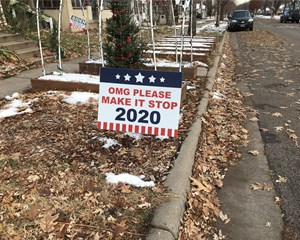But even so, very little of what we watched helped us make sense of this moment. We're bored, we're anxious, we're overworked or, worse, unemployed: We've had lots of time to get to know ourselves better, which often leaves us more bewildered and less trusting of our judgment. We're drained. We give up and watch The Office again, though there are worse things. This isn't the time to be hard on ourselves for not knowing exactly what we want, except to continue to remain healthy and alive, and to do what we can to make sure the same goes for our neighbors and loved ones. Amid the pandemic's worst days of New York's first wave—those days in April when the number of cases and deaths continued to climb, when refrigerated trucks lined up to keep corpses from rotting, when we had no idea how, or if, this horror could be stemmed—one of my neighbors stepped out onto his fire escape during the evening cheer and recreated Jimi Hendrix's "The Star Spangled Banner" on his guitar. The notes wailed and withered, swelled and crested, a story we'd heard a million times yet somehow needed to hear right then. Those of us listening from our windows—perhaps, out of laziness or depression, still in our pj's at 7 p.m.—clung to its ragged majesty. Why didn't our forebears choose a more singable national anthem? Because they were waiting for the invention of the electric guitar.
但即便如此,我們所看到的很難能幫助我們理解這一刻。我們感到無聊、焦慮、勞累過度,或者更糟糕的是,我們失業了:我們有很多時間來更好地了解自己,這往往讓我們更加困惑,更不相信對自己的判斷。我們精疲力盡了,我們無力掙扎了,雖然糟糕的事情一大堆,但我們只能再看一次《辦公室》。現在不是因為自己不知道究竟想要什么而對自己苛刻的時候,現在我們要做的是健康地活著,同時盡自己所能確保鄰居和所愛之人也能健康地活著。在紐約第一波疫情最嚴重的日子里——4月份的那些日子里,病例和死亡人數持續攀升,當冷藏卡車排著隊防止尸體腐爛時,當我們不知道如何或者是否可以阻止這種恐懼時——在晚上的歡呼聲中,我的一個鄰居走到自家的消防梯上,用他的吉他重現了吉米·亨德里克斯的《星條旗閃爍》。音符悲鳴,時而枯萎,時而高漲,那是一個我們已經聽過無數遍的故事,但不知怎的,此刻的我們需要再聽一聽。我們這些在窗戶邊傾聽的人——或許是出于懶惰或沮喪,晚上7點還穿著睡衣——緊緊依附著它那破敗的威嚴。為什么我們的祖先沒有選一首更動聽的國歌呢?因為他們在等待電吉他的發明。

We're tired with good reason, but our flag is still there. This virus attacks the weakest and most vulnerable and has thus disproportionately affected certain portions of the population. All the rules and restrictions have made us weary, yet it's more important than ever to be vigilant. When the U.S. COVID-19 death toll reached 200,000, the magnitude of that number seemed unimaginable. Now it pushes toward 300,000, though the promise of several vaccines at least offers hope. For now, members of our families, friends whom we love dearly, people we've never met but whose work has touched us continue to die. The virus is a blanket problem that hits all of us in painfully personal, targeted ways.
我們厭倦了充分的理由,但我們的旗幟還在那里。這種病毒攻擊最脆弱的群體,因此對特定人群造成了不成比例的影響。所有的規則和限制都讓我們厭煩,但我們卻需要比以往任何時候更加警惕。當美國新冠死亡人數達到20萬時,這一數字之大令人難以想象。雖說有幾種疫苗的前景至少帶來了希望,但現在這一數字已經逼近30萬。現在,我們的家人,我們親愛的朋友,還有那些我們素未謀面但工作令我們感動的人相繼死去。這種病毒包羅萬象,以一種令個人痛苦的、有針對性的方式襲擊著我們所有人。
Meanwhile, our President himself contracted the virus and, just days after being pumped through with steroids and experimental treatments, emerged in public—still, almost beyond doubt, contagious—to crow that if he could kick the disease, we could too. Shortly thereafter, he lost an election and insisted he hadn't—more gaslighting, but at least we're having some success stopping up the valve that's emitting the fumes. Democracy isn't dead yet. Somehow we patched it up with a scrap of duct tape, just in time.
同時我們的總統也感染了病毒,在接受類固醇注射和實驗性治療的幾天之后他出現在了公眾面前——毫無疑問他還具有傳染性——他得意洋洋地說如果自己能夠戰勝病毒,那么我們也能。不久之后他輸掉了選舉,但他堅稱自己沒有輸——反而說出更多蠱惑言論,但至少我們已經成功地堵住了排放煙霧的閥門。民主還沒有倒下,我們用一小塊膠帶及時把它修好了。
Will it hold? Americans are inherently optimistic. It's why our allies like us, even if they secretly mock us behind our backs—but we don't care! We're a nation with our thumbs perpetually stuck in our suspenders. Our optimism is our most ridiculous trait, and our greatest. It can't always be morning in America. Sometimes we have to get through the darkest hour just before. The aurora bides its time.
能堅持下去嗎?這就是為什么我們的盟友喜歡我們,即使他們在我們背后偷偷嘲笑我們——但我們不在乎!我們是一個拇指永遠卡在背帶里的國家,樂觀是我們最可笑的品質,也是我們最偉大的品質。美國不可能永遠都是早上,有時我們必須熬過剛剛過去的最黑暗的時刻,極光在等待時機。
譯文由可可原創,僅供學習交流使用,未經許可請勿轉載。











